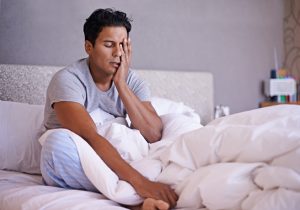 Headaches, irritability, depression, difficulty focusing and concentrating are all telltale signs of sleep apnea. It can be hard however, to determine if you have sleep apnea since it occurs at night, and many of the symptoms can be attributed to other health concerns. What causes sleep apnea? There are actually many factors. Dr. Donald Marks is going to discuss if sleep apnea in State College is hereditary, and some of the other contributing factors to look for.
Headaches, irritability, depression, difficulty focusing and concentrating are all telltale signs of sleep apnea. It can be hard however, to determine if you have sleep apnea since it occurs at night, and many of the symptoms can be attributed to other health concerns. What causes sleep apnea? There are actually many factors. Dr. Donald Marks is going to discuss if sleep apnea in State College is hereditary, and some of the other contributing factors to look for.
What is Sleep Apnea?
The most common form of sleep apnea occurs when your airway becomes obstructed during the night, cutting off vital oxygen to your organs. The lack of oxygen signals your brain to wake you up, which can happen hundreds of times during the night. Though you may not even realize that you’re waking up multiple times at night, you body realizes it and suffers from the lack of rest and rejuvenation.
Sleep apnea can be very debilitating and greatly affect the quality of your life. You may struggle to concentrate and complete your normal tasks during the day. It can also take a toll on your personal and professional relationships. If left untreated, sleep apnea also contributes to a number of other health issues including:
- Diabetes
- Heart disease or failure
- High blood pressure
- Weight gain
- Painful headaches and migraines
- Stroke
The Contributing Factors of Sleep Apnea
Researchers have found that family history does increase your risk for sleep apnea. Excessive weight, use of alcohol or sedatives, smoking and tobacco products, also increases your risk of suffering from sleep apnea. You can discuss ways to reduce your risk of sleep apnea with your physician.
How is Sleep Apnea Treated?
CPAP, or continuous positive airway pressure therapy, is the standard of care for treating sleep apnea. Many patients have difficulties using this machine however, because it does require that you wear a mask at night while you sleep. This causes feelings of claustrophobia, or difficulties getting comfortable during the night, and sadly many patients are not able to properly utilize their CPAP machine to gain the benefits it offers.
The good news is that Dr. Marks has been helping patients with sleep apnea get a good night’s rest for over 25 years. He offers an alternative therapy with oral appliances designed to slightly reposition your jaw and open your airway during the night. Oral appliances are comfortable to wear and easy to get used to, so they’re ideal for patients who suffer from mild to moderate sleep apnea.
If you’re ready to reclaim your rest and your health, we encourage you to contact our office today to learn more about how Dr. Marks can help you manage your sleep apnea.
